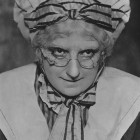Bertha Lewis Suggest updates
Bertha Amy Lewis.
Born London, 12 May 1887.
Died Cambridge, 8 May 1931.
English contralto.
Bertha Lewis was the leading contralto of the D'Oyly Carte company over a twenty year period.
She studied at the Royal Academy of Music, and sang in concerts and opera. Initially she joined D’Oyly Carte in 1906, singing chorus and small roles.
After a gap working with the Musical Comedy Company, and making several recordings, she rejoined D’Oyly Carte at the end of 1914. Lewis then sang the contralto roles continuously until 1931, when she died of injuries after a car crash while on tour.
Lewis was married to the concert bass Herbert Heyner. Several of her roles were recorded, including Buttercup (1930).
A Newspaper Interview
Dundee Advertiser: Wednesday, December 20 1922 p4
“My Age!” - Miss Bertha Lewis Discusses an Impression - From a Special Correspondent
There was an exquisitely feminine touch in the first remarks made by Miss Bertha Lewis, the noted contralto of the D’Oyly Carte Opera Company, to an Advertiser representative who called at her hotel yesterday afternoon.
With a mischievous twinkle in her eye, she said, “I want you to contradict the impression that I am old.”
I deprecated with haste any implication the words might convey, that I was ever given to dealing in such delicate matters as ladies’ ages.
Miss Lewis laughed. “Let me make myself clear,” she said, “In the part of Dame Hannah in Ruddigore, which is to be played to-night in Dundee, I create a character that is very old and wizened. Now, people who have heard me time and again in the operas, with their imagination heightened by the vision of this character, are coming to the conclusion that I am nearing the end of my tether. At a queue waiting to attend a Ruddigore performance, an old lady has been heard to remark, ‘My! She must be getting old now, she has been playing with the company for a long, long time, now!’
“Now,” said the famous operatic contralto, “in case there is any such misunderstanding in Dundee, I want to say that, while I am proud of my long association with the D’Oyly Carte Company, it is better that people should know that I joined the company this century, and not last.
“In spite of this misapprehension which the part may create regarding the length of my connection with this world,” she continued, “it is one of my favourite parts. Dame Hannah in Ruddigore and Lady Jane in Patience share the warmest spot in my affections. The songs connected with the characters, I think, in each case, are responsible for this attachment. There is no more wonderful contralto song in the whole of Gilbert and Sullivan, in my opinion, than ‘Silver is the Raven Hair,’ sung by Lady Jane while playing the double bass fiddle.
“By the way, I had a rather trying experience in Aberdeen last week when I was singing this song. The bridge of the fiddle suddenly parted when I was about to play, and the strings were left dangling. The audience laughed, and I had to laugh with them. What else was there to do? But I made an effort, and induced some of the audience to believe, I understand, that it was intended.”
Talk drifted round to the great Billington. At one time Billington, who was a big man, weighed 20 stones. “Poor Pitti Sing,” I murmured, thinking of Billington’s weight and the rolling incident in The Mikado.
“Billington,” said Miss Lewis, “may have been a big man, but he was wonderfully active in his movements. In The Mikado he had that tumble so arranged that he scarcely touched Pitti Sing when rolling over her. Ko-Ko, though, I am afraid, very often got most of the weight. All those things are a matter of knack, of course. My lifting Mr Lytton off the stage in Patience falls under the same category. I have to confess in passing that I have let him fall twice, and, I am afraid, hurt him. However, in apologising, I reminded him that I hadn’t dealt hardly with him on the whole, since I had only dropped him twice in eight years. ‘Twice too often,’ was his observation.”
I ran into Mr Henry Lytton as I was leaving the hotel. I mentioned that I had been to see Miss Lewis, and that we had been discussing his tips to amateurs with reference to the feminine side of the operas.“Same advice to all,” he said. “Learn to stand still. And, by the way, when on this subject, I think that perhaps in my article in your paper to-day I gave out a wrong impression, as if I specifically singled out the new members of the D’Oyly Carte Company to illustrate my point about not standing still. It is noticeable to the keen observer from the front of the house in any professional company, and the new members of the D’Oyly Carte - the novitiate, I mean - have the advantage of being specially trained to avoid such an artistic faux pas, and are quick to see its value.”
Roles in Scotland
- Lady Blanche Professor of Abstract Science
-
Princess Ida 1915
Princess Ida 1918
Princess Ida 1922
- Annabella, Lady Sangazure a Lady of Ancient Lineage
-
Sorcerer 1916
Sorcerer 1918
- Katisha an elderly Lady, in love with Nanki-Poo
-
Mikado 1916
Mikado 1918
Mikado 1922
- Dame Carruthers Housekeeper to the Tower
-
Yeomen of the Guard 1916
Yeomen of the Guard 1918
- Lady Jane a rapturous maiden
-
Patience 1916
Patience 1918
- Duchess of Plaza-Toro
-
Gondoliers 1916
Gondoliers 1918
Gondoliers 1922
- Ruth a Piratical Maid of all Work
-
Pirates of Penzance 1918
- Little Buttercup Mrs Cripps, a Portsmouth Bumboat Woman
-
H M S Pinafore 1918
- Queen of the Fairies
-
Iolanthe 1918
Iolanthe 1922
- Dame Hannah Rose's Aunt
-
Ruddigore 1922

